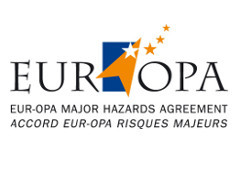COVID-19

The EUR-OPA Major Hazards Agreement has long been a useful reference for global efforts to reduce the risk of disasters. It puts a particular emphasis on ensuring that vulnerable groups are not left behind in emergencies.
Key resources related to disaster preparedness and response can be found on our new COVID-19 page. These resources were developed under the EUR-OPA Agreement or by the EUR-OPA network and its partners. They are intended to inform and guide the public, emergency management practitioners, policy makers and other relevant actors in the current coronavirus crisis.
We will be continually adding updates and additions to this page.
Resources from EUR-OPA
- "Major hazards, migrants, asylum seekers and refugees" (2017) offers guidelines and recommendations on how to include migrants, asylum seekers and refugees in disaster preparedness and management.
- "Migrants in Disaster Risk Reduction" (2017) presents practices and lessons learned on the integration of migrants into decision making, policy-setting and implementation of disaster risk reduction initiatives. It builds upon the knowledge and experiences gathered throughout the EUR-OPA programme on “Migrants, asylum seekers and refugees in the context of major risks prevention and management” as well as on the Migrants In Countries In Crisis Initiative (MICIC), in collaboration with the International Organization for Migration (IOM), and Overseas Development Institute.
- E-learning tool “Including Migrants in Emergency Management”offers emergency management practitioners information and tools to provide services in a more inclusive manner, accounting for migrants’ specific behaviors and preferences. It was developed by IOM, in collaboration with EUR-OPA and the Intercultural Cities Programme (ICC) of the Council of Europe. The free online course is available in English, Spanish, and Italian upon registration on IOM’s e-learning platform.
- "Major Hazards and People With Disabilities. Their involvement in Disaster Preparedness and Response" (2014) is a resource for guidelines and recommendations on how to include people with disabilities in disaster preparedness and response. The practical toolkit is available here.
- "Ethical Principles on Disaster Risk Reduction and People's Resilience" (2012) identifies ethical principles with a view to contributing to disaster risk reduction.
- "Lessons learned in psychosocial care after disasters" (2010) offers country examples of good practices of psychosocial care after a disaster. The publication was prepared in collaboration with the European Federation of Psychologists' Associations (EFPA).
Resources from Specialised Centres
- The European Center for Disaster Medicine (CEMEC, San Marino), one of EUR-OPA’s Specialised Centres, has developed video clips with COVID-19 related information and tips available in Italian, English, Spanish, French, German, Russian and Arabic.
- The European Center for Disaster Medicine (CEMEC, San Marino) has developed a smartphone application designed to improve migrants' access to care.
- The Global Fire Monitoring Center (GFMC), one of EUR-OPA's Specialised Centres, has set up a special page dedicated to landscape fire management during the COVID-19 pandemic.
Resources from International Partners
- The World Health Organisation (WHO) offers advice and guidance on its COVID-19 page.
- The response of the International Organization for Migration (IOM) to COVID-19, which includes multi-lingual information and key resources, can be found on its website.
- Information provided by the UN Office for Disaster Risk Reduction (UNDRR) is available here.
- The Directorate-General for European Civil Protection and Humanitarian Aid Operations (ECHO) offers information on the European Commission's response to COVID-19 on its website.
- The response and resources of the United Nations Educational, Scientific and Cultural Organisation (UNESCO) can be found on their dedicated webpage.
- The European Federation of Psychologists’ Associations (EFPA) provides multi-lingual psychosocial information and advice for children and adults on its COVID-19 webpage.
Resources from bodies of the Council of Europe
- The Directorate General for Democracy and the Directorate General Human Rights and Rule of Law have each launched a new page dedicated to the response to COVID-19.



